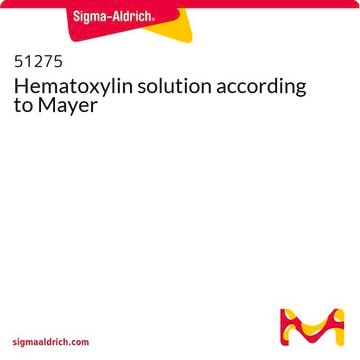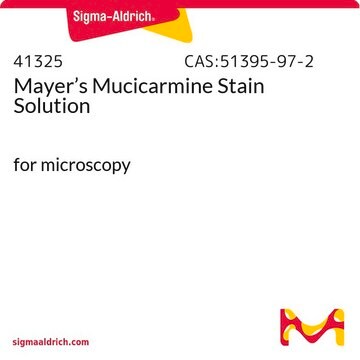1.09249
Mayer′s hemalum solution
for microscopy
About This Item
Produits recommandés
Niveau de qualité
Forme
liquid
IVD
for in vitro diagnostic use
Technique(s)
microbe id | staining: suitable
Densité
1.05 g/cm3 at 20 °C
Application(s)
clinical testing
diagnostic assay manufacturing
hematology
histology
Température de stockage
15-25°C
Description générale
The 500 ml bottle is sufficient for 1500 stainings. It is registered as IVD and CE certified product and can be used for clinical diagnostics. For more details, please see instructions for use (IFU). The IFU can be downloaded from this webpage.
Remarque sur l'analyse
Nuclei: dark blue to dark violet
Cytoplasm: pink to red
intercellular substances: pink to red
Erythrocytes: yellow to orange
Mention d'avertissement
Warning
Mentions de danger
Conseils de prudence
Classification des risques
Acute Tox. 4 Oral - Eye Irrit. 2 - STOT RE 2 Oral
Organes cibles
Kidney
Code de la classe de stockage
10 - Combustible liquids
Classe de danger pour l'eau (WGK)
WGK 1
Certificats d'analyse (COA)
Recherchez un Certificats d'analyse (COA) en saisissant le numéro de lot du produit. Les numéros de lot figurent sur l'étiquette du produit après les mots "Lot" ou "Batch".
Déjà en possession de ce produit ?
Retrouvez la documentation relative aux produits que vous avez récemment achetés dans la Bibliothèque de documents.
Les clients ont également consulté
Contenu apparenté
Apprenez-en davantage sur le caractère critique de la coloration de tissus biologiques pour la recherche et la biologie médicale en utilisant des colorants standards et spéciaux.
Apprenez-en davantage sur le caractère critique de la coloration de tissus biologiques pour la recherche et la biologie médicale en utilisant des colorants standards et spéciaux.
Learn about the criticality of biological tissue staining for research and clinical pathology using standard and special stains and dyes.
Learn about the criticality of biological tissue staining for research and clinical pathology using standard and special stains and dyes.
Notre équipe de scientifiques dispose d'une expérience dans tous les secteurs de la recherche, notamment en sciences de la vie, science des matériaux, synthèse chimique, chromatographie, analyse et dans de nombreux autres domaines..
Contacter notre Service technique











